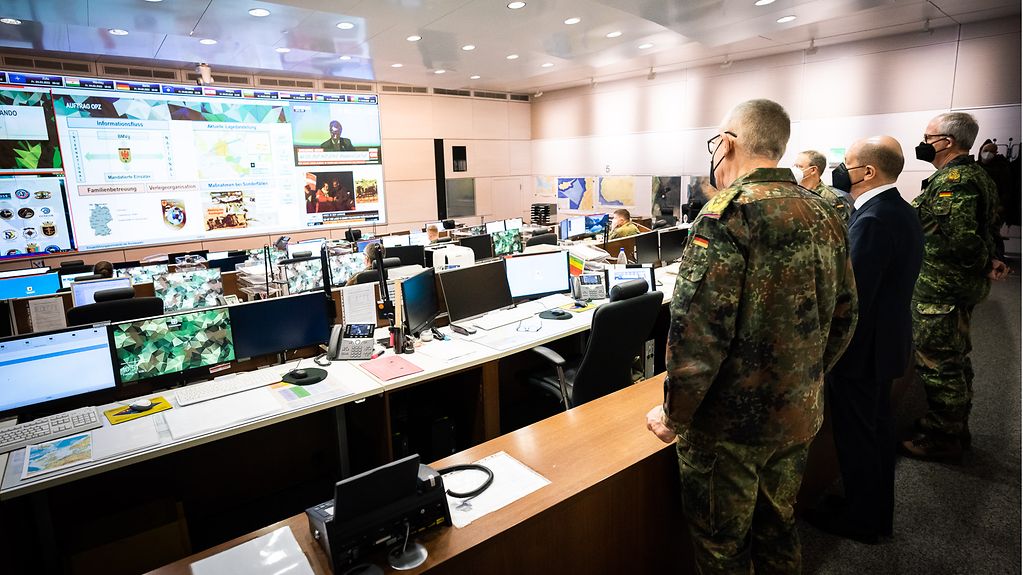Federal Chancellor visits Joint Forces Operations Command
On a visit to the Joint Forces Operations Command of the Federal Armed Forces, Federal Chancellor Olaf Scholz learned about the complex details of troop deployment and military operations. He was particularly interested in the deployment of soldiers in connection with the NATO mission in Lithuania.
3 min reading time

At the operations centre of the Joint Forces Operations Command, Federal Chancellor Olaf Scholz gained an impression of how the Federal Armed Forces are deployed on foreign missions.
Photo: Bundesregierung/Kugler
On his visit to the Joint Forces Operations Command in Potsdam, Federal Chancellor Olaf Scholz stressed that the Federal Government was fully aware of its responsibility for the armed forces. Their commitment deserved the best possible support on each and every mission, said the Federal Chancellor. “Soldiers make a key contribution to our security – both abroad and at home.”
Dialogue with soldiers
Scholz was particularly keen to get first-hand impressions of the Joint Forces Operations Command’s mission and hear about the challenges faced in the various regions in which the Federal Armed Forces are deployed. This also included engaging in dialogue with service personnel. “Once again, a very big thank-you to the Federal Armed Forces and all soldiers,” said Scholz.
The Federal Chancellor’s visit had been planned for some time but was now primarily set against the backdrop of the Russian attack on Ukraine.
Additional funds to support professionalism
Scholz pointed out that it was right to provide the Federal Armed Forces with plenty of additional funding for equipment. “This sends out the right signal and supports the professionalism of the work that has been done here for a very long time – something we want to continue to rely on in the future,” said Scholz.
He stressed that all efforts were aimed at ultimately bringing peace to Ukraine. It was also important for Scholz to stress that the NATO member states were not involved in the war. “We are not part of this war,” said Scholz.
Making use of all political and diplomatic options
The aim is to achieve a ceasefire and the withdrawal of Russian troops by political means and through diplomacy.
“We are making use of our political options as far as sanctions are concerned, which we announced well in advance,” Scholz said. These had already had a severe impact on Russia’s economic development potential, he noted. Otherwise, all room for manoeuvre was being exploited to bring about an end to this war by diplomatic means.
“It is vital for us to keep a cool head and to remain clear, resolute and cautious,” said Scholz. The aim was to prevent the conflict from spreading beyond Ukraine, he added.
At the same time, NATO member states are jointly ensuring that no one attacks the territory of a NATO country. For this reason, member states have intensified their joint efforts at the borders of the Baltic states, Poland, Slovakia, Hungary, Romania and Bulgaria. “However, these measures are purely defensive and remain on NATO territory,” said Scholz.
Refugee intake
Europe has opted to ensure its arrangements for the admission of refugees to the EU are free of unnecessary bureaucracy. All EU countries have started to prepare for this. In Germany, Federal Minister of the Interior Nancy Faeser is working with the Länder on the necessary preparations.
At Joint Forces Operations Command, the Inspector General of the Federal Armed Forces, Eberhard Zorn, and the Head of Joint Forces Operations Command, General Schütt, provided Scholz with detailed information on ongoing deployments of the Federal Armed Forces and their operational command. The focus was on the two missions in the Sahel – EUTM Mali and Minusma – as well as the Federal Armed Forces’ contribution to the enhanced forward presence (eFP) in Lithuania.
At the end of the visit, Scholz went to the “Forest of Remembrance” to commemorate those servicemen and women who died in the line of duty.